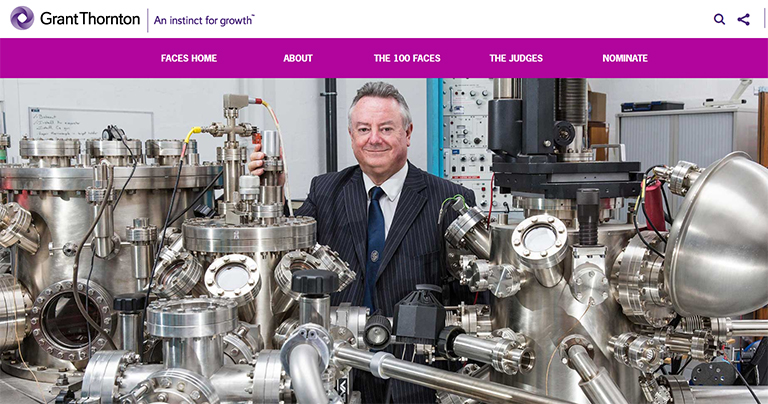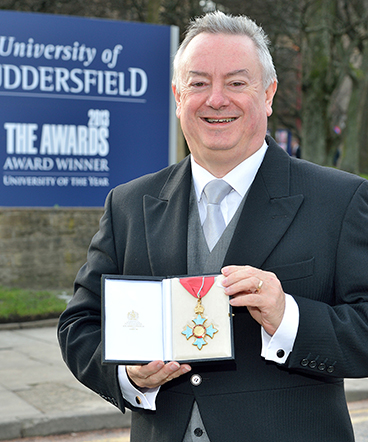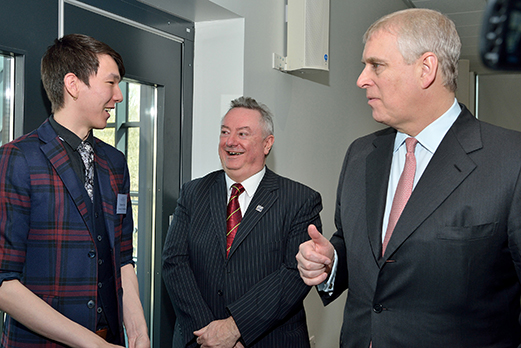VC invited to join Grant Thornton 100 Faces of a Vibrant Economy

Fri, 08 Jul 2016 13:00:00 BST
Through the project, Grant Thornton have set out to identify and showcase the people who can unlock Britain’s potential
 ► Professor Cryan received his CBE on 2014
► Professor Cryan received his CBE on 2014
ONE of the world’s top financial services firms has named the University of Huddersfield’s Vice-Chancellor, Professor Bob Cryan CBE, as one of the 100 men and women with the capability to transform Britain’s economy in the wake of Brexit.
Grant Thornton – which has member companies operating in more than 130 countries – set out to identify and showcase the people who can unlock Britain’s potential. The result is a list of 100 Faces of a Vibrant Economy. All the individuals selected have been specially photographed by the famous international co-operative Magnum Photos.
The list includes figures from many areas of business, politics and public service. Professor Cryan is one of just three from the Higher Education sector. An engineer by background, he is also deeply involved in encouraging entrepreneurialism and regenerating the regional economy, serving on the board of the Leeds City Region Enterprise Partnership.
After an academic career that saw him holding key posts at several institutions, Professor Cryan became Vice-Chancellor of his hometown university in 2007. His mission has been to make it ‘Inspiring, Innovative and International’ and its awards have included the title University of the Year, bestowed by influential journal, The Times Higher Education.
He has actively encouraged entrepreneurialism among students, and the University of Huddersfield is home to The Duke of York Young Entrepreneur Centre, named after the Duke, who is the University’s Chancellor.
Professor Cryan, who was made CBE in 2014, is delighted to have been selected as one of Grant Thornton’s 100 Faces.
“At the heart of a vibrant economy are people that are appropriately skilled to create ideas in the first place,” he said.
“Young people are not given the right exposure, the curriculum has not been business-focused enough. We’re trying to make the economy vibrant by producing highly-qualified, highly-skilled individuals.
“Quite often great ideas die at an early stage because they can’t get funding,” continued Professor Cryan. “We create entrepreneurial spaces in which people can mix and spark off each other, creating great networking opportunities. There is now a movement in many universities to create similar ‘entrepreneur spaces’ like ours at the University of Huddersfield.”
 ◄ Professor Cryan pictured with the University’s Chancellor, HRH The Duke of York (right), at The Duke of York Young Entrepreneur Awards
◄ Professor Cryan pictured with the University’s Chancellor, HRH The Duke of York (right), at The Duke of York Young Entrepreneur Awards
The Duke of York Young Entrepreneur Centre at the University offers free support and free premises for students at the start-up stage, creating a pipeline for young firms to be established. It is based in the University’s 3M Buckley Innovation Centre, which is the base for a huge diversity of enterprises from start-ups to regional offices of multi-national companies.
Grant Thornton states that selecting its 100 Faces of a Vibrant Economy was part of a mission to unlock the potential of Britain. The list features leading figures from the public and private sectors and the showcased individuals are proven to deliver inspiring leadership and innovation and to demonstrate social purpose.
The CEO of Grant Thornton UK, Sacha Romanovitch, comments: “We’re celebrating the achievements of 100 Faces driving a vibrant economy and sharing their stories to inspire others,” she continued. “Some are inspiring leaders, empowering their employees to reach their full potential. Others are using innovation to help their local communities, and some have created businesses with a clear, social purpose helping everyone from refugees to families that rely on food banks.
“We are connecting and convening these inspirational figures to help us unlock the true potential of the UK. Instead of seeking out the challenges, and focusing on the problems, we believe that by sharing inspiring examples from businesses, government and communities, we can look at how to replicate these across the UK for the good of the economy, and the communities in which we live and serve.”







